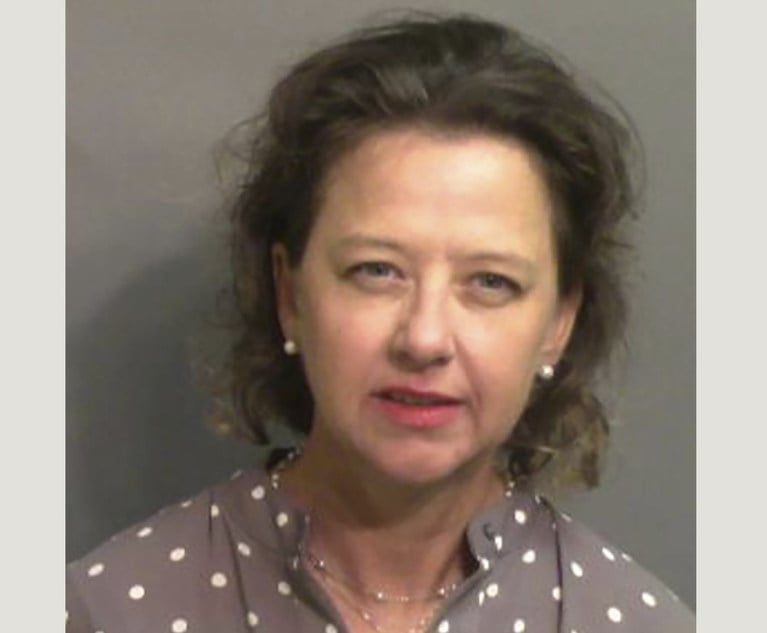McIver Defense Promises to Appeal Jury's Guilty Verdict for Murder
The jury also convicted McIver of aggravated assault, possession of a firearm during the commission of a felony and influencing a witness.
April 23, 2018 at 04:35 PM
4 minute read

A Fulton County jury on Monday convicted Atlanta attorney Claud “Tex” McIver of felony murder for the 2016 shooting of his wife, Diane McIver.
The jury also convicted Tex McIver of aggravated assault, possession of a firearm during the commission of a felony and influencing a witness. The influencing a witness charge stemmed from what prosecutors argued were McIver's efforts to persuade Dani Jo Carter—who was driving the SUV when he shot his wife—not to talk with police about the shooting.
The jury of five men and seven women acquitted McIver of malice murder. Malice murder requires forethought as well as intent. Felony murder is a homicide that occurs during the commission of a felony—in this case aggravated assault.
The verdict came hours after Fulton County Superior Court Chief Judge Robert McBurney issued an Allen charge to the deadlocked jury in an attempt to push them toward a consensus.
District Attorney Paul Howard said McIver would be taken into custody immediately and sentenced at a later date. Felony murder carries a mandatory life sentence in Georgia.
At a news conference after court adjourned, Howard said, “Diane, we hope you are watching, and we hope you feel we stood for you.”
Billy Corey, chairman of U.S. Enterprises where Diane McIver was president, said the jurors “stood up for Diane today,” adding, “May Diane rest in peace.”
Executive Assistant District Attorney Clint Rucker, who led the prosecution, said he spoke to jurors after they convicted Tex McIver.
“They had a real plan about how they went about their deliberations,” he said. He said that although they appeared deadlocked, “They expressed to me they were happy about the fact the judge asked them to go back and finish their work.”
“They were very, very confident in their verdict,” Rucker said. The legal issue of intent “provided some challenges for them,” he added. “It took them a while to kind of dissect the language of the charge.”
Rucker also said he believes the jurors' decision to revisit the McIvers' Ford Expedition, and sit where McIver had sat while holding the revolver he fired “proved pivotal.”
McIver's sister, Dixie Martin, who was at her brother's trial every day, had no comment. Annie Anderson, the massage therapist who testified for the defense to say she had been unfairly maligned by prosecutorial innuendo to suggest she had a romantic or a sexual relationship with McIver, began sobbing and left the courtroom in tears.
Defense attorney Bruce Harvey said following the verdict, “There is no question” that McIver will appeal the conviction. “I do think it is a travesty in that it is the triumph of emotion over reason. It is a sad day for the rule of reason … I don't believe for a minute that Tex McIver deliberately shot his wife in the fashion that they say occurred, and I will never believe that, no matter what the speculation, innuendo, or other unproven emotional matters, and frankly, aberrant behavior [that took place] after the event occurred.”
He also questioned the practice of allowing jurors to pose questions to witnesses after the lawyers finished their examinations. Although the Supreme Court of Georgia has approved the practice, Harvey said that in a criminal trial, “I think it changes that Sixth Amendment dynamic. … It remains an issue, and will be an issue, I'm confident.”
In convicting McIver of murder, the jury rejected arguments put forth by his defense that Diane McIver's shooting on Sept. 25, 2016, was an accident rooted in a chronic sleep disorder that caused him to unintentionally fire his Smith & Wesson .38-caliber revolver while sitting in the rear seat of the couple's SUV.
They also rejected an alternative charge of felony involuntary manslaughter resulting from reckless conduct—a lesser offense McBurney added to the list of charges the jury could consider.
Tex McIver fired the gun as the couple was being driven home by Carter. The bullet pierced the front seat where Diane McIver was sitting. The McIvers were traveling on a midtown Atlanta thoroughfare at about 10 p.m. and had just stopped at a traffic light across from Piedmont Park when the gun fired.
The original jury was evenly split between men and women, but one male juror left the case during the trial's first week because of a family medical emergency.
This content has been archived. It is available through our partners, LexisNexis® and Bloomberg Law.
To view this content, please continue to their sites.
Not a Lexis Subscriber?
Subscribe Now
Not a Bloomberg Law Subscriber?
Subscribe Now
NOT FOR REPRINT
© 2025 ALM Global, LLC, All Rights Reserved. Request academic re-use from www.copyright.com. All other uses, submit a request to [email protected]. For more information visit Asset & Logo Licensing.
You Might Like
View All
Fulton DA Seeks to Overturn Her Disqualification From Trump Georgia Election Case
3 minute read
Glynn County Judge Rejects Ex-DA's Motion to Halt Her Misconduct Trial in Ahmaud Arbery Investigation

Trump Election-Interference Prosecution Appears on Course to Wind Down
4 minute read
Judge Sets Early 2025 Trial for Ex-Prosecutor Charged With Meddling in Ahmaud Arbery Investigation
3 minute readTrending Stories
Who Got The Work
J. Brugh Lower of Gibbons has entered an appearance for industrial equipment supplier Devco Corporation in a pending trademark infringement lawsuit. The suit, accusing the defendant of selling knock-off Graco products, was filed Dec. 18 in New Jersey District Court by Rivkin Radler on behalf of Graco Inc. and Graco Minnesota. The case, assigned to U.S. District Judge Zahid N. Quraishi, is 3:24-cv-11294, Graco Inc. et al v. Devco Corporation.
Who Got The Work
Rebecca Maller-Stein and Kent A. Yalowitz of Arnold & Porter Kaye Scholer have entered their appearances for Hanaco Venture Capital and its executives, Lior Prosor and David Frankel, in a pending securities lawsuit. The action, filed on Dec. 24 in New York Southern District Court by Zell, Aron & Co. on behalf of Goldeneye Advisors, accuses the defendants of negligently and fraudulently managing the plaintiff's $1 million investment. The case, assigned to U.S. District Judge Vernon S. Broderick, is 1:24-cv-09918, Goldeneye Advisors, LLC v. Hanaco Venture Capital, Ltd. et al.
Who Got The Work
Attorneys from A&O Shearman has stepped in as defense counsel for Toronto-Dominion Bank and other defendants in a pending securities class action. The suit, filed Dec. 11 in New York Southern District Court by Bleichmar Fonti & Auld, accuses the defendants of concealing the bank's 'pervasive' deficiencies in regards to its compliance with the Bank Secrecy Act and the quality of its anti-money laundering controls. The case, assigned to U.S. District Judge Arun Subramanian, is 1:24-cv-09445, Gonzalez v. The Toronto-Dominion Bank et al.
Who Got The Work
Crown Castle International, a Pennsylvania company providing shared communications infrastructure, has turned to Luke D. Wolf of Gordon Rees Scully Mansukhani to fend off a pending breach-of-contract lawsuit. The court action, filed Nov. 25 in Michigan Eastern District Court by Hooper Hathaway PC on behalf of The Town Residences LLC, accuses Crown Castle of failing to transfer approximately $30,000 in utility payments from T-Mobile in breach of a roof-top lease and assignment agreement. The case, assigned to U.S. District Judge Susan K. Declercq, is 2:24-cv-13131, The Town Residences LLC v. T-Mobile US, Inc. et al.
Who Got The Work
Wilfred P. Coronato and Daniel M. Schwartz of McCarter & English have stepped in as defense counsel to Electrolux Home Products Inc. in a pending product liability lawsuit. The court action, filed Nov. 26 in New York Eastern District Court by Poulos Lopiccolo PC and Nagel Rice LLP on behalf of David Stern, alleges that the defendant's refrigerators’ drawers and shelving repeatedly break and fall apart within months after purchase. The case, assigned to U.S. District Judge Joan M. Azrack, is 2:24-cv-08204, Stern v. Electrolux Home Products, Inc.
Featured Firms
Law Offices of Gary Martin Hays & Associates, P.C.
(470) 294-1674
Law Offices of Mark E. Salomone
(857) 444-6468
Smith & Hassler
(713) 739-1250






